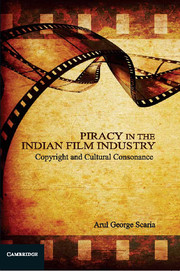Book contents
- Frontmatter
- Dedication
- Contents
- Preface
- Acknowledgments
- List of Abbreviations
- 1 Introduction
- 2 Piracy and the Indian Film Industry
- 3 Copyright Law in India: A Historical, Cultural and Legal Analysis
- 4 Copyright Piracy and Consumers: Insights from an Empirical Survey
- 5 In Search of Optimal Legal and Policy Options
- 6 Conclusion
- Appendix 1 Detailed Description of the Methodology Used in the Study
- Appendix 2 Questionnaire Used for the Empirical Survey
- Appendix 3 Tables
- Bibliography
- Index
4 - Copyright Piracy and Consumers: Insights from an Empirical Survey
Published online by Cambridge University Press: 05 June 2014
- Frontmatter
- Dedication
- Contents
- Preface
- Acknowledgments
- List of Abbreviations
- 1 Introduction
- 2 Piracy and the Indian Film Industry
- 3 Copyright Law in India: A Historical, Cultural and Legal Analysis
- 4 Copyright Piracy and Consumers: Insights from an Empirical Survey
- 5 In Search of Optimal Legal and Policy Options
- 6 Conclusion
- Appendix 1 Detailed Description of the Methodology Used in the Study
- Appendix 2 Questionnaire Used for the Empirical Survey
- Appendix 3 Tables
- Bibliography
- Index
Summary
Overview
Chapter 3 provided an overview of the evolution of copyright law in India and also the general attitude of the Indian judiciary towards copyright issues. But as discussed in Chapter 1, mere existence of strict laws or even a favourable judiciary may not ensure higher copyright compliance in this digital era. It is the acceptance of exclusivity as a social norm that will play the most prominent role in higher copyright compliance. This chapter provides an overview of the major findings from an empirical survey conducted as part of the research. The survey was conducted among undergraduate students from four different streams of education (arts, science, engineering and law), in three different types of locations (cities, towns and villages) in different parts of India. This methodological approach was taken primarily to address the issue of diversity within the Indian society, particularly in the context of widening differences between the urban and the rural India.
The important dimensions explored through the empirical survey were exposure to different pirate media, subjective norms in the society, perceptions regarding the negative effects of piracy, benefits of piracy, lawfulness of different behaviours, legal risks and morality of piracy. This chapter highlights the major findings on all these important dimensions. The chapter also highlights some of the important thoughts shared by the consumers regarding the causes as well as the solutions for piracy in the Indian film industry, through the same survey instrument.
- Type
- Chapter
- Information
- Piracy in the Indian Film IndustryCopyright and Cultural Consonance, pp. 103 - 138Publisher: Cambridge University PressPrint publication year: 2014



